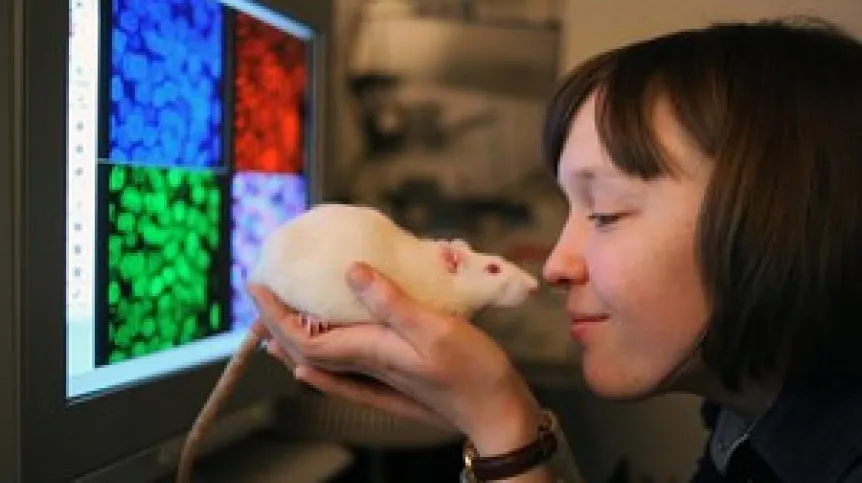
Researchers at the Nencki Institute of Experimental Biology PAS in Warsaw a previously unknown mechanism of memory trace formation. It turns out that in some cases, neurons can remember thanks to changes in the arrangement of DNA.
Researchers from the Warsaw institute have demonstrated that during neuron stimulation (cells of the nervous system) permanent changes occur in the distribution of genes in the nucleus. The discovery is important for a better understanding of the nature of mental processes and disorders of the nervous system, especially the brain. The Nencki Institute representatives reported the results published in the prestigious journal "Journal of Neuroscience" in the release sent to PAP.
"While conducting experiments on rats after epileptic seizures we have observed that a gene may permanently move deeper into the neuron\'s cell nucleus. Since modification of the geometrical structure of the nucleus leads to changes in gene expression, this is how the neuron remembers, what happened" - explains Prof. Grzegorz Wilczyński from the Laboratory of Molecular and Systemic Neuromorphology at the Nencki Institute.
Neurons connect with each another via synapses and form extended networks. In order for the neuronal networks to retain traces of stimuli which caused activation, the shape and functioning of individual synapses must change. If a stimulus trace should be permanent, changes in the expression of many genes located in the cell nucleus of individual neurons are necessary.
Representatives of the Nencki Institute reminded that genes are sections of DNA chain coding certain proteins. But the gene is not always active - gene expression also depends on the environment within the cell. Chromatin (DNA strands with proteins) which fills cells contains gene activating or suppressing substances. "This somewhat resembles interpersonal relations. When you attend a social gathering the importance of what you say will have a different impact depending on the environment. If the environment is favourable, your opinion will be seized on and reinforced and you will achieve social impact. If the environment is less friendly, your opinion will be silenced" - described Prof. Wilczyński.
In the case of neurons the epigenetic processes (during which gene expression is decided by the environment) have been associated only with chemical reactions within the chromatin. "Research done at the Nencki Institute has shown that in neurons we deal with yet another type of epigenetic effects: changes to the spatial structure of the cell\'s nucleus resulting in the formation of permanent memory traces. This is possible for two reasons. First of all because of the presence of the nuclear membrane: genes can attach or detach from it, which impacts their expression. The second reason is related to the specific structure of the cell nucleus" - explained researchers from the Nencki Institute.
They explained that the nucleus of a cell consists of many globules, called chromosome domains or territories. Each domain is filled by a single chromosome, which may slightly move within its territory. As a result of such movement, fragments of the DNA chains containing the different genes can come in contact at the meeting points of the neighbouring domains. This leads to silencing of a group of genes or to their expression. However, a slight movement of the DNA chain in any domain changes the expression of genes.
Changes to the spatial arrangement of genes within the cell nucleus have already been observed in certain types of cells, including epithelium cells. Researchers at the Nencki Institute have shown that external stimuli may cause similar changes within neurons.
Neurons used in the study came from rats after epileptic seizure, which is a brain plasticity disorder. During the seizure, turbulent gene expression occurs in the activated neurons. Scientists from the Nencki Institute in collaboration with the group of Prof. Marek Świtoński from the University of Life Sciences in Poznań, and with Prof. Marion Cremer from Munich observed two genes and marked their location within the DNA chains using a substance glowing after stimulation with laser light. Scientists analysed preparations of neurons from control rats and neurons coming from rats after epileptic seizures.
They studied more than 5000 cell nuclei to determine the location of both investigated genes with relation to the nuclei centres and the nuclear membrane. For one of the genes (BDNF), a change in location of a few hundred nanometres (one billionth part of a metre) has been observed; in the control animals this gene was present near the nuclear membrane or on it in 50% of the nuclei, while in animals after seizures this value dropped to approximately 25%.
"A double drop is a great change in biology. Moreover, we have observed that it remains visible for up to several weeks. The conclusion is therefore clear: past events are remembered by neurons also thanks to changes within the architecture of their cell nuclei" - said Prof. Wilczyński.
The research has been financed from the Polish-Norwegian Grant and the Innovative Economy Operational Programme.
PAP - Science and Scholarship in Poland
lt/ agt/ mrt/
tr. RL













